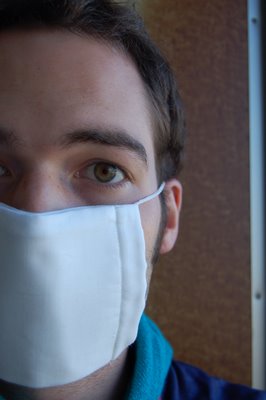Dear all,
Apologies for long gap between postings. Will be remedied forthwith.
But from now on, they will appear at
http://nipponlamford.blogspot.com
See that page for full details.
Also, I'm filling in a lot of the gaps that I've missed over the past months, so be sure to check down the page for new additions.
Thanks to all for reading,
Ollie
Saturday, May 12, 2007
Wednesday, January 10, 2007
Daizenji Fire Festival
It all began on Sunday afternoon when I took the train to Daizenji with my friend Dave. We knew we were meeting a woman called Norika there, that she would take us somewhere, and there we would take most of our clothes off, get drunk, and do something with fire outside. I didn't know any more than that though.
Norika turned out to be a lovely middle aged woman with good English and leather trousers. Immensely kind and helpful, she took us to a house where we were immediately invited in and sat down at a table with 8 or so guys eating a real banquet of sushi, lobster, stew, and a lot of alcohol. Our host, a compact and very self assured man, handed me a cup, and poured sake into it. I thanked him and took a sip, and every one looked at me. Big pause. I took another sip. Another pause. 'Do you like Sake?' they asked, concerned. Finally I caught on, and downed the rest in one large gulp. Everyone looked relieved. Clearly I had been too polite. The cup went to Dave, and he swallowed it all. The conversation moved on, and we ate a fine meal. They even gave us a cup of shochu, from a bottle that cost 30,000yen. That's about £150. It was really very nice. 'Drink it slowly' they said. They were really nice people, but unfortunately, as we've only been learning Japanese for 3months, we can't actually 'chat' much yet. We weigh heavy and damp on any conversation, like wet bread.
Then I went off and had a dip in the communal bath, before our host dressed me. I stood fully naked, with my back to him, as he passed a white cloth under my legs, and I held it in place as he twisted it to go between my bum cheeks, and wrapped it round my waist many times. I spun around as he coiled it around my tummy, occasionally stopping to place a knee against my hip and pull it very tight. My stomach was held very close like a corset, and I had a long loincloth stretching from my waist down to my calves.
I returned to the table, by which time most of the guys had got pretty legless. Lots of photos were taken, especially of us two: the two gaijin alone; the gaijin holding sake bottles; the gaijin with each guy in turn; the gaijin holding someone up high to make him look taller; the gaijin with the host's daughters; etc ,etc, etc. Here's one of the whole group:
 The host is on my left; from what I could tell he was a rich and powerful man, though what he did I do not know. Dave is to his left, and then a very drunk old guy who decided he was our Japanese father.
The host is on my left; from what I could tell he was a rich and powerful man, though what he did I do not know. Dave is to his left, and then a very drunk old guy who decided he was our Japanese father.
We all donned neat black slipper socks and old straw sandals, attached by rough strings that wrapped around our feet, collected our 8foot long wooden torches, and ran into the dark cold night...
Which wasn't actually that cold. I guess that's why we drank so much sake.
So we all stood outside the train station and posed with our unlit torches and shouted something at the people coming out of the station, before marching off to meet larger groups. We joined them to form a group of 50 or so, and gathered around a small fire, as more sake was passed round. Then we lit our torches and marched off to the temple. As we marched the leaders would shout 'OS-SAA!' and we would call back 'OS-SAA!'. It passed back and forth in time with our feet, pounding along at walking pace. Occasionally we would stop, and thrust our torches into the air as we shouted in unison 'SEYYYYYYY!'. It was like being in a local militia of spearmen in 16th century Japan, shouting to feel stronger and braver in the cold dark air. We saw other columns of men marching in the same direction in other streets; a mood of growing tension and excitement at the sight of competition. Eventually we reached the temple, and found huge bonfires to warm our cold bodies:
 More sake went around. Got talking to a couple of guys who turned out to be journalists. Despite being in the middle of a fire festival, this was still Japan, so one of them gave me his business card. Rather short of pockets, I stuffed it down my cotton body wrap. Then we paraded around the temple with our torches, chanting and thrusting our flames into the air, before returning for more warmth and sake. There was a lot of sake...
More sake went around. Got talking to a couple of guys who turned out to be journalists. Despite being in the middle of a fire festival, this was still Japan, so one of them gave me his business card. Rather short of pockets, I stuffed it down my cotton body wrap. Then we paraded around the temple with our torches, chanting and thrusting our flames into the air, before returning for more warmth and sake. There was a lot of sake...
 Then off we went to the main event. There was a brief ritual where our torch bearer said some kind of greeting to the mayor of the nearby city (we met him earlier, and bowed lots, cos that's what everyone else was doing). They threw water on themselves from little cups, and then lit the torch and we all shouted lots (this bit was fun - see pic below). That's my host in the middle with one arm up, wearing a red bandana to show that he is in charge. The torch bearer had two guys to support his arms, because he had to hold it up in the air for about 2hours.
Then off we went to the main event. There was a brief ritual where our torch bearer said some kind of greeting to the mayor of the nearby city (we met him earlier, and bowed lots, cos that's what everyone else was doing). They threw water on themselves from little cups, and then lit the torch and we all shouted lots (this bit was fun - see pic below). That's my host in the middle with one arm up, wearing a red bandana to show that he is in charge. The torch bearer had two guys to support his arms, because he had to hold it up in the air for about 2hours.
 We marched into the main area through all the crowds, and surrounded a huge wooden column, angled up like a cannon. Just one in a row of 5 or 6 of these monsters. It was about 1.5m across, made of thick bamboo, and sprouting a mass of dry of leaves and branches. Men walked up the column to pour fire lighter on the leaves. After a peculiar slow dance with two masked men (all slow walking and briefly waved hands - but with none of the grace of Noh), they lit our cannon. (It's not really a cannon, but I like the word, so I shall use it). Huge flames came out. We weren't cold anymore:
We marched into the main area through all the crowds, and surrounded a huge wooden column, angled up like a cannon. Just one in a row of 5 or 6 of these monsters. It was about 1.5m across, made of thick bamboo, and sprouting a mass of dry of leaves and branches. Men walked up the column to pour fire lighter on the leaves. After a peculiar slow dance with two masked men (all slow walking and briefly waved hands - but with none of the grace of Noh), they lit our cannon. (It's not really a cannon, but I like the word, so I shall use it). Huge flames came out. We weren't cold anymore:
Then one by one the cannons began to move. Yes, MOVE. When it came to our turn, I saw how. We all took hold of a long wooden stick, and stuck it into the bamboo. With a loud 'SEYYY!' we lifted it up. So that's why we kept practising shouting and thrusting into the air...
Then we began to march off, parading what was essentially an immensely heavy burning tree around the temple. Occasionally we would stop and rest it on a huge bamboo cross carried by two hefty guys underneath the cannon. Other men waved leafy green branches, trying to stop the sparks landing on us. Not that it made much difference; everyone got a lot of tiny burns and singes on their skin. Again, so THAT'S why everyone drinks so much sake. One old guy told me that it was good for your health if the sparks fell on you. I am dubious.
This is basically what I saw:

And here's a picture of my favourite character of the night:
 He had a neat little moustache, shaven/bald head, and a strong build for a man who must have been in his late 50s. He was like an old samurai general. At one point, he suddenly appeared and shouted at everyone. Immediately they stopped dead, and sheepishly blinked at the floor as he proceeded to harangue a large group of 50 drunk and testosterone-fuelled men. I think we were doing something wrong, but no idea what. He had absolute authority over them all; intensely practical and in his element, leading such a large group of men. An awesome individual.
He had a neat little moustache, shaven/bald head, and a strong build for a man who must have been in his late 50s. He was like an old samurai general. At one point, he suddenly appeared and shouted at everyone. Immediately they stopped dead, and sheepishly blinked at the floor as he proceeded to harangue a large group of 50 drunk and testosterone-fuelled men. I think we were doing something wrong, but no idea what. He had absolute authority over them all; intensely practical and in his element, leading such a large group of men. An awesome individual.
 All this time, men were beating drums and ringing bells without rest. A really charged atmosphere. Two guys started shouting and fighting, and had to be pulled apart. The man next to me got his stick in the wrong place, and it slipped forward and smacked me on the eyebrow. Again, the sake helped.
All this time, men were beating drums and ringing bells without rest. A really charged atmosphere. Two guys started shouting and fighting, and had to be pulled apart. The man next to me got his stick in the wrong place, and it slipped forward and smacked me on the eyebrow. Again, the sake helped.
I really wanted to walk up the cannons, but though I mentioned it to a few people they just laughed at me. It looked so exciting up there!

When we had finally made a circuit of the temple, our cannon had burned down about half way. We took it on our shoulders, and our torchbearer sprinted through under the fire and beneath the length of the cannon. Then we put it down and he ran over the top. It was doused in water, and the festival was over. Suddenly, it was cold and dark...
Luckily, my friends Heather and Brendan were around to take these pictures of the event. We stayed in our host's house over night, which was actually pretty excruciating. I hate being a burden on people, especially when out of pure social obligation, but Japanese hospitality demands the guest do absolutely nothing and the host provide their every need. They were hugely kind, but I actually WANTED to help out, wash up or whatever. They would have none of it. As we talked late at night, they asked us what we liked to eat at breakfast, and stupidly we started eulogising about the virutes of the English fry up. The next morning, we were presented with a piece of toast, and a fried egg. And jam. And chopsticks. They watched us expectantly. Deal with that one on a hangover.
Norika turned out to be a lovely middle aged woman with good English and leather trousers. Immensely kind and helpful, she took us to a house where we were immediately invited in and sat down at a table with 8 or so guys eating a real banquet of sushi, lobster, stew, and a lot of alcohol. Our host, a compact and very self assured man, handed me a cup, and poured sake into it. I thanked him and took a sip, and every one looked at me. Big pause. I took another sip. Another pause. 'Do you like Sake?' they asked, concerned. Finally I caught on, and downed the rest in one large gulp. Everyone looked relieved. Clearly I had been too polite. The cup went to Dave, and he swallowed it all. The conversation moved on, and we ate a fine meal. They even gave us a cup of shochu, from a bottle that cost 30,000yen. That's about £150. It was really very nice. 'Drink it slowly' they said. They were really nice people, but unfortunately, as we've only been learning Japanese for 3months, we can't actually 'chat' much yet. We weigh heavy and damp on any conversation, like wet bread.
Then I went off and had a dip in the communal bath, before our host dressed me. I stood fully naked, with my back to him, as he passed a white cloth under my legs, and I held it in place as he twisted it to go between my bum cheeks, and wrapped it round my waist many times. I spun around as he coiled it around my tummy, occasionally stopping to place a knee against my hip and pull it very tight. My stomach was held very close like a corset, and I had a long loincloth stretching from my waist down to my calves.
I returned to the table, by which time most of the guys had got pretty legless. Lots of photos were taken, especially of us two: the two gaijin alone; the gaijin holding sake bottles; the gaijin with each guy in turn; the gaijin holding someone up high to make him look taller; the gaijin with the host's daughters; etc ,etc, etc. Here's one of the whole group:
 The host is on my left; from what I could tell he was a rich and powerful man, though what he did I do not know. Dave is to his left, and then a very drunk old guy who decided he was our Japanese father.
The host is on my left; from what I could tell he was a rich and powerful man, though what he did I do not know. Dave is to his left, and then a very drunk old guy who decided he was our Japanese father.We all donned neat black slipper socks and old straw sandals, attached by rough strings that wrapped around our feet, collected our 8foot long wooden torches, and ran into the dark cold night...
Which wasn't actually that cold. I guess that's why we drank so much sake.
So we all stood outside the train station and posed with our unlit torches and shouted something at the people coming out of the station, before marching off to meet larger groups. We joined them to form a group of 50 or so, and gathered around a small fire, as more sake was passed round. Then we lit our torches and marched off to the temple. As we marched the leaders would shout 'OS-SAA!' and we would call back 'OS-SAA!'. It passed back and forth in time with our feet, pounding along at walking pace. Occasionally we would stop, and thrust our torches into the air as we shouted in unison 'SEYYYYYYY!'. It was like being in a local militia of spearmen in 16th century Japan, shouting to feel stronger and braver in the cold dark air. We saw other columns of men marching in the same direction in other streets; a mood of growing tension and excitement at the sight of competition. Eventually we reached the temple, and found huge bonfires to warm our cold bodies:
 More sake went around. Got talking to a couple of guys who turned out to be journalists. Despite being in the middle of a fire festival, this was still Japan, so one of them gave me his business card. Rather short of pockets, I stuffed it down my cotton body wrap. Then we paraded around the temple with our torches, chanting and thrusting our flames into the air, before returning for more warmth and sake. There was a lot of sake...
More sake went around. Got talking to a couple of guys who turned out to be journalists. Despite being in the middle of a fire festival, this was still Japan, so one of them gave me his business card. Rather short of pockets, I stuffed it down my cotton body wrap. Then we paraded around the temple with our torches, chanting and thrusting our flames into the air, before returning for more warmth and sake. There was a lot of sake... Then off we went to the main event. There was a brief ritual where our torch bearer said some kind of greeting to the mayor of the nearby city (we met him earlier, and bowed lots, cos that's what everyone else was doing). They threw water on themselves from little cups, and then lit the torch and we all shouted lots (this bit was fun - see pic below). That's my host in the middle with one arm up, wearing a red bandana to show that he is in charge. The torch bearer had two guys to support his arms, because he had to hold it up in the air for about 2hours.
Then off we went to the main event. There was a brief ritual where our torch bearer said some kind of greeting to the mayor of the nearby city (we met him earlier, and bowed lots, cos that's what everyone else was doing). They threw water on themselves from little cups, and then lit the torch and we all shouted lots (this bit was fun - see pic below). That's my host in the middle with one arm up, wearing a red bandana to show that he is in charge. The torch bearer had two guys to support his arms, because he had to hold it up in the air for about 2hours. We marched into the main area through all the crowds, and surrounded a huge wooden column, angled up like a cannon. Just one in a row of 5 or 6 of these monsters. It was about 1.5m across, made of thick bamboo, and sprouting a mass of dry of leaves and branches. Men walked up the column to pour fire lighter on the leaves. After a peculiar slow dance with two masked men (all slow walking and briefly waved hands - but with none of the grace of Noh), they lit our cannon. (It's not really a cannon, but I like the word, so I shall use it). Huge flames came out. We weren't cold anymore:
We marched into the main area through all the crowds, and surrounded a huge wooden column, angled up like a cannon. Just one in a row of 5 or 6 of these monsters. It was about 1.5m across, made of thick bamboo, and sprouting a mass of dry of leaves and branches. Men walked up the column to pour fire lighter on the leaves. After a peculiar slow dance with two masked men (all slow walking and briefly waved hands - but with none of the grace of Noh), they lit our cannon. (It's not really a cannon, but I like the word, so I shall use it). Huge flames came out. We weren't cold anymore:Then one by one the cannons began to move. Yes, MOVE. When it came to our turn, I saw how. We all took hold of a long wooden stick, and stuck it into the bamboo. With a loud 'SEYYY!' we lifted it up. So that's why we kept practising shouting and thrusting into the air...
Then we began to march off, parading what was essentially an immensely heavy burning tree around the temple. Occasionally we would stop and rest it on a huge bamboo cross carried by two hefty guys underneath the cannon. Other men waved leafy green branches, trying to stop the sparks landing on us. Not that it made much difference; everyone got a lot of tiny burns and singes on their skin. Again, so THAT'S why everyone drinks so much sake. One old guy told me that it was good for your health if the sparks fell on you. I am dubious.
This is basically what I saw:

And here's a picture of my favourite character of the night:
 He had a neat little moustache, shaven/bald head, and a strong build for a man who must have been in his late 50s. He was like an old samurai general. At one point, he suddenly appeared and shouted at everyone. Immediately they stopped dead, and sheepishly blinked at the floor as he proceeded to harangue a large group of 50 drunk and testosterone-fuelled men. I think we were doing something wrong, but no idea what. He had absolute authority over them all; intensely practical and in his element, leading such a large group of men. An awesome individual.
He had a neat little moustache, shaven/bald head, and a strong build for a man who must have been in his late 50s. He was like an old samurai general. At one point, he suddenly appeared and shouted at everyone. Immediately they stopped dead, and sheepishly blinked at the floor as he proceeded to harangue a large group of 50 drunk and testosterone-fuelled men. I think we were doing something wrong, but no idea what. He had absolute authority over them all; intensely practical and in his element, leading such a large group of men. An awesome individual. All this time, men were beating drums and ringing bells without rest. A really charged atmosphere. Two guys started shouting and fighting, and had to be pulled apart. The man next to me got his stick in the wrong place, and it slipped forward and smacked me on the eyebrow. Again, the sake helped.
All this time, men were beating drums and ringing bells without rest. A really charged atmosphere. Two guys started shouting and fighting, and had to be pulled apart. The man next to me got his stick in the wrong place, and it slipped forward and smacked me on the eyebrow. Again, the sake helped.I really wanted to walk up the cannons, but though I mentioned it to a few people they just laughed at me. It looked so exciting up there!

When we had finally made a circuit of the temple, our cannon had burned down about half way. We took it on our shoulders, and our torchbearer sprinted through under the fire and beneath the length of the cannon. Then we put it down and he ran over the top. It was doused in water, and the festival was over. Suddenly, it was cold and dark...
Luckily, my friends Heather and Brendan were around to take these pictures of the event. We stayed in our host's house over night, which was actually pretty excruciating. I hate being a burden on people, especially when out of pure social obligation, but Japanese hospitality demands the guest do absolutely nothing and the host provide their every need. They were hugely kind, but I actually WANTED to help out, wash up or whatever. They would have none of it. As we talked late at night, they asked us what we liked to eat at breakfast, and stupidly we started eulogising about the virutes of the English fry up. The next morning, we were presented with a piece of toast, and a fried egg. And jam. And chopsticks. They watched us expectantly. Deal with that one on a hangover.
Saturday, December 02, 2006
Miscellaneous Eccentricity 2 [Muzak]
Muzak 1
The powers that be pipe music into my dormitory canteen. It’s always changing: one day its the New World Symphony; the next, Britney. But yesterday the music sounded like a ten year old on a Xylophone. In fact, I think it probably was a ten year old on a Xylophone. And then I recognized the song. Tinkling along in well spaced notes was the tune from
Hitler, has only got one ball,
The other, is in the Albert Hall...
Muzak 2
I’ve been in several bars that, at the end of each night, play Auld Lang Syne over the P.A system.
Muzak 3
The major pedestrian crossings in the city play loud music when the lights turn green. North/South intersections play a jaunty little tune - apparently it's from a Scottish folk song. It's a very electronic noise, but even that cannot deaden the irritatingly upbeat jingle. In stark contrast is the music of the East/West intersections - a maudlin death march played on a Wurlitzer. I much prefer moving with the sun.
The powers that be pipe music into my dormitory canteen. It’s always changing: one day its the New World Symphony; the next, Britney. But yesterday the music sounded like a ten year old on a Xylophone. In fact, I think it probably was a ten year old on a Xylophone. And then I recognized the song. Tinkling along in well spaced notes was the tune from
Hitler, has only got one ball,
The other, is in the Albert Hall...
Muzak 2
I’ve been in several bars that, at the end of each night, play Auld Lang Syne over the P.A system.
Muzak 3
The major pedestrian crossings in the city play loud music when the lights turn green. North/South intersections play a jaunty little tune - apparently it's from a Scottish folk song. It's a very electronic noise, but even that cannot deaden the irritatingly upbeat jingle. In stark contrast is the music of the East/West intersections - a maudlin death march played on a Wurlitzer. I much prefer moving with the sun.
Miscellaneous Eccentricity 1

It being Autumn, there is a lot of leaf sweeping to be done. There are often university workers to be seen clearing up the heaped drifts, in a suit with broom in hand.
At times, they get a little over eager. Last week I saw a smartly dressed man standing five metres up a tree, using his broom to sweep leaves straight from the branch.
Thursday, November 30, 2006
Tuesday, November 21, 2006
Takachiho Gorge
Japan is a beautiful place, but its countryside is scarred with concrete. Flat land is built on, or farmed. Steep land is useless, so allowed to grow free. But even there, the cloud soaked hills bear the weight of large red and white pylons, rivers are strictly channelled, and bridges abound. There seems to be little concept of wilderness here, as all is tamed, directed, sanitised.
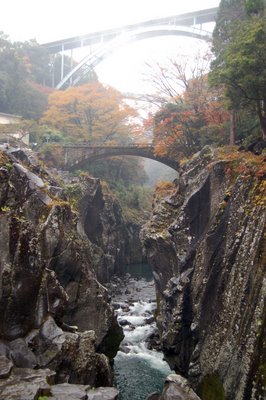 Bridges seem to come in threes, stacked above each other.
Bridges seem to come in threes, stacked above each other.
Fact: No river in Japan remains undammed.
The cause is well documented. The civil engineers make the decisions, not environmentalists. Politicians pump in money for public work schemes that reduce unemployment and shift benefits to the democratically-stronger countryside constituencies. Murkier dealings come to light from time to time; there is a lot of money to be made in construction, legally or not.
But there seems to be more going on in the underlying attitude to nature here. The Japanese have a strong sense that nature is out to get them, whether by Tsunami, Earthquake, Typhoon, Jellyfish [see entry for 10/21/06]. There is some truth in it, but the resulting paranoia is both restrictive and damaging.
I went to see the great gorge in Takachiho, central Kyushu; a wonderful place, with scuplted rock, corrugated cliffs, and cool green water.
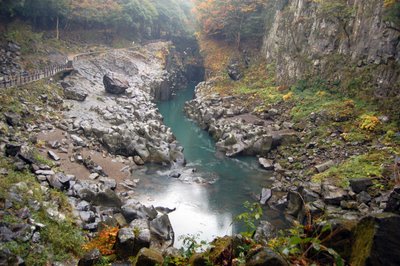
The gorge is lined with concrete paths and fences. At least, it keeps the hordes of tourists in one place.
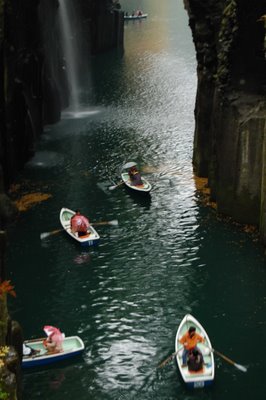
But the most beautiful part of the gorge has become a boating pond, for tourists to row around in. Or rather, for tourists to photograph each other rowing around in. While in fact going in circles. Is there a word to describe something that is at once comic and depressing?
As the gorge opens up at the end of the tourist trail, the path continues, but signs tell you not to carry on: “Dangerous! Stop!” Knowing by now the civil authority’s attitude to danger (ie paranoia), I carried on walking. As it turned out, by ‘danger’, it meant you would not have been able to get along it in a wheelchair. Probably not recommended for the infirm or very elderly. The path was wide and concrete, the river mellow, the single boulder easy to cross.
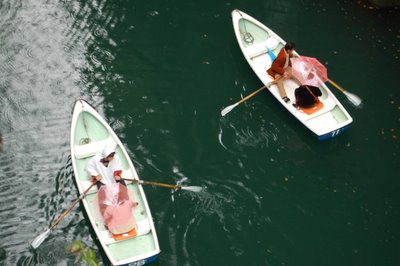 I should point out that these excessive warnings are not like those in the U.K. or America. Japan does not share our highly litigious culture. These signs are not the ‘Get out of Jail’ cards that our companies and organisations sprinkle so liberally to prevent damaging court cases. Rather, I think these are a sign of the very strong sense of public duty and culpability in Japanese society. If someone hurt themselves, that would be YOUR fault, as municipal worker.
I should point out that these excessive warnings are not like those in the U.K. or America. Japan does not share our highly litigious culture. These signs are not the ‘Get out of Jail’ cards that our companies and organisations sprinkle so liberally to prevent damaging court cases. Rather, I think these are a sign of the very strong sense of public duty and culpability in Japanese society. If someone hurt themselves, that would be YOUR fault, as municipal worker.
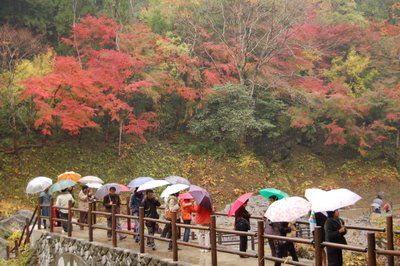 As I walked, I grumbled to myself about all this paranoia and environmental damage. I clambered around on the rocks, and sat in the drizzle on a boulder, twisting around to try to find a direction that would allow me to avoid seeing any concrete. As I stepped from one stone to the next, it gave way beneath me, and I sprawled into the river, banging my knee and drenching my leg.
As I walked, I grumbled to myself about all this paranoia and environmental damage. I clambered around on the rocks, and sat in the drizzle on a boulder, twisting around to try to find a direction that would allow me to avoid seeing any concrete. As I stepped from one stone to the next, it gave way beneath me, and I sprawled into the river, banging my knee and drenching my leg.
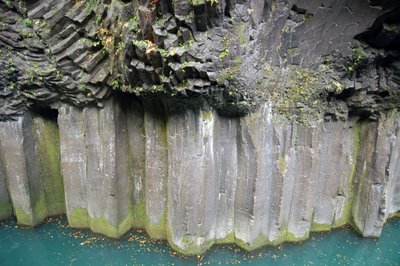 I limped back into town, tail between my legs. I think something heard me muttering about paranoia.
I limped back into town, tail between my legs. I think something heard me muttering about paranoia.
 Bridges seem to come in threes, stacked above each other.
Bridges seem to come in threes, stacked above each other.Fact: No river in Japan remains undammed.
The cause is well documented. The civil engineers make the decisions, not environmentalists. Politicians pump in money for public work schemes that reduce unemployment and shift benefits to the democratically-stronger countryside constituencies. Murkier dealings come to light from time to time; there is a lot of money to be made in construction, legally or not.
But there seems to be more going on in the underlying attitude to nature here. The Japanese have a strong sense that nature is out to get them, whether by Tsunami, Earthquake, Typhoon, Jellyfish [see entry for 10/21/06]. There is some truth in it, but the resulting paranoia is both restrictive and damaging.
I went to see the great gorge in Takachiho, central Kyushu; a wonderful place, with scuplted rock, corrugated cliffs, and cool green water.

The gorge is lined with concrete paths and fences. At least, it keeps the hordes of tourists in one place.

But the most beautiful part of the gorge has become a boating pond, for tourists to row around in. Or rather, for tourists to photograph each other rowing around in. While in fact going in circles. Is there a word to describe something that is at once comic and depressing?
As the gorge opens up at the end of the tourist trail, the path continues, but signs tell you not to carry on: “Dangerous! Stop!” Knowing by now the civil authority’s attitude to danger (ie paranoia), I carried on walking. As it turned out, by ‘danger’, it meant you would not have been able to get along it in a wheelchair. Probably not recommended for the infirm or very elderly. The path was wide and concrete, the river mellow, the single boulder easy to cross.
 I should point out that these excessive warnings are not like those in the U.K. or America. Japan does not share our highly litigious culture. These signs are not the ‘Get out of Jail’ cards that our companies and organisations sprinkle so liberally to prevent damaging court cases. Rather, I think these are a sign of the very strong sense of public duty and culpability in Japanese society. If someone hurt themselves, that would be YOUR fault, as municipal worker.
I should point out that these excessive warnings are not like those in the U.K. or America. Japan does not share our highly litigious culture. These signs are not the ‘Get out of Jail’ cards that our companies and organisations sprinkle so liberally to prevent damaging court cases. Rather, I think these are a sign of the very strong sense of public duty and culpability in Japanese society. If someone hurt themselves, that would be YOUR fault, as municipal worker. As I walked, I grumbled to myself about all this paranoia and environmental damage. I clambered around on the rocks, and sat in the drizzle on a boulder, twisting around to try to find a direction that would allow me to avoid seeing any concrete. As I stepped from one stone to the next, it gave way beneath me, and I sprawled into the river, banging my knee and drenching my leg.
As I walked, I grumbled to myself about all this paranoia and environmental damage. I clambered around on the rocks, and sat in the drizzle on a boulder, twisting around to try to find a direction that would allow me to avoid seeing any concrete. As I stepped from one stone to the next, it gave way beneath me, and I sprawled into the river, banging my knee and drenching my leg. I limped back into town, tail between my legs. I think something heard me muttering about paranoia.
I limped back into town, tail between my legs. I think something heard me muttering about paranoia.
Tuesday, November 07, 2006
When in Rome...
Saturday, November 04, 2006
Karatsu Kunchi
362 days a year, Karatsu is an unexceptional fishing town. It is next to a beautiful pine forest (with a big road through the middle of it), and a lovely beach (facing an industrial plant), and has a large C17th castle (built in 1966). But for the three days of the Karatsu Kunchi, the town shakes off the dust, swaps its work clothes for ceremonial garb, and holds its head up high.
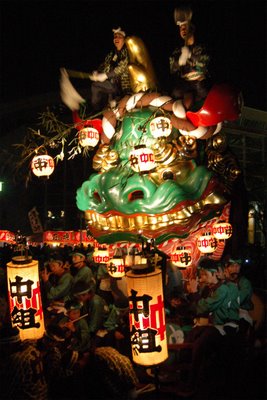
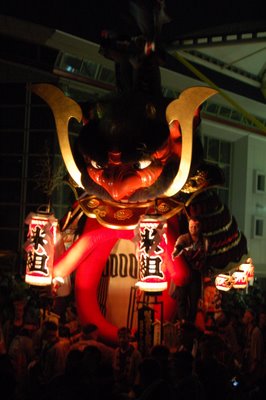
 Fourteen floats, each three stories high and several tonnes in weight, are dragged in grand style through the town by hundreds of people. The floats are between 150 and 200 years old, but remain immaculately decorated and in pristine condition.
Fourteen floats, each three stories high and several tonnes in weight, are dragged in grand style through the town by hundreds of people. The floats are between 150 and 200 years old, but remain immaculately decorated and in pristine condition.
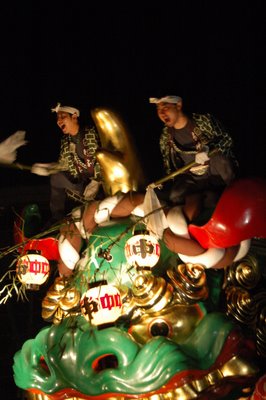 Given that they are clearly such treasures, it is heartening to see two men perched atop every float, urging the straining crowds onto greater efforts. The two men on top throw a repetitive chant back and forth with each tug of the rope:
Given that they are clearly such treasures, it is heartening to see two men perched atop every float, urging the straining crowds onto greater efforts. The two men on top throw a repetitive chant back and forth with each tug of the rope:
"Aye-yar aye-yar aye-yar aye! Aye-yar aye-yar aye-yar aye! Aye-yar aye-yar aye-yar aye!"
They keep that up for three days, waving sticks and lanterns above their heads, trying to keep up the energy of the group. Even at a standstill, they maintain the chant; a matter of pride to be seen to be having more fun than the other groups. For three days, the Sake flows, and the voices grow hoarse, but the shouting doesn't stop.
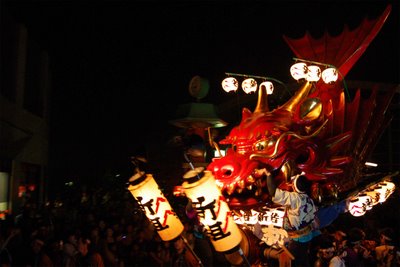
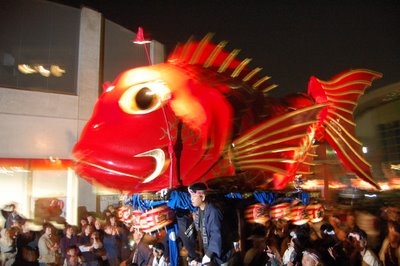 These are no mere museum exhibits; these are living parts of the town, at once both symbol and participant in the life of the place. Each float represents a different part of town, and is pulled only by people from that area.
These are no mere museum exhibits; these are living parts of the town, at once both symbol and participant in the life of the place. Each float represents a different part of town, and is pulled only by people from that area.
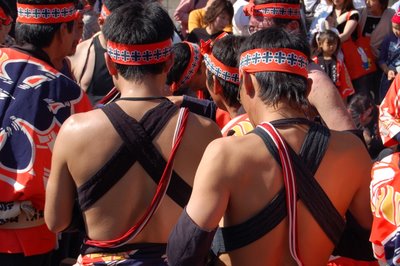 Every group wears a distinct, vividly coloured outfit. They range in age from the toddlers placed in the float and kids who lead the procession, through the burly men who manhandle it around the corners, right up to the greying old geezers who follow behind, grumbling about turning circles.
Every group wears a distinct, vividly coloured outfit. They range in age from the toddlers placed in the float and kids who lead the procession, through the burly men who manhandle it around the corners, right up to the greying old geezers who follow behind, grumbling about turning circles.
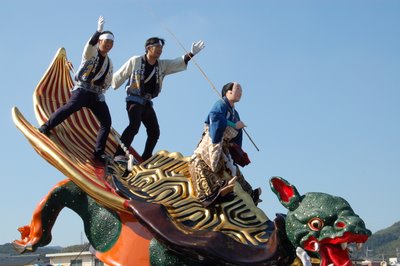
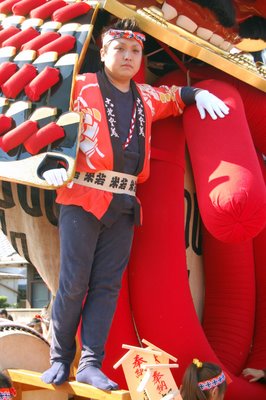 It is essentially quite a simple festival (after all, they are only pushing carts around). But they make sure they squeeze every last drop of interest out of it; pulled at night, pulled during the day; pulled through sand; pulled as fast as possible.
It is essentially quite a simple festival (after all, they are only pushing carts around). But they make sure they squeeze every last drop of interest out of it; pulled at night, pulled during the day; pulled through sand; pulled as fast as possible.

This is no tourist event; it's a festival with a future. All ages take part, and those kids will be in charge of the floats in decades to come. Its strength comes from the competitive pride it creates between people from different parts of the town, striving to better each other.
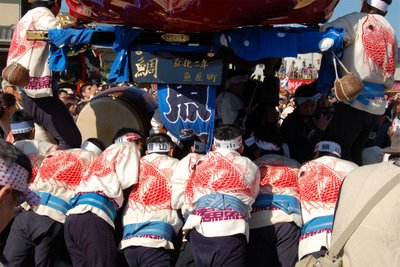
Just as with the correfoc and castellers of Barcelona, petty local rivalries are transformed into a positive creative force. No one could create a festival like this from scratch, top down; it needed to grow from its roots to become strong.
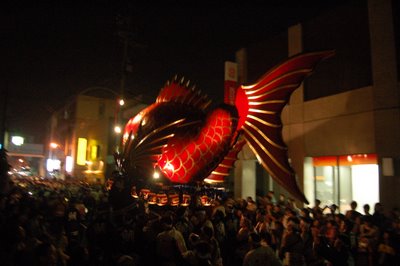


 Fourteen floats, each three stories high and several tonnes in weight, are dragged in grand style through the town by hundreds of people. The floats are between 150 and 200 years old, but remain immaculately decorated and in pristine condition.
Fourteen floats, each three stories high and several tonnes in weight, are dragged in grand style through the town by hundreds of people. The floats are between 150 and 200 years old, but remain immaculately decorated and in pristine condition. Given that they are clearly such treasures, it is heartening to see two men perched atop every float, urging the straining crowds onto greater efforts. The two men on top throw a repetitive chant back and forth with each tug of the rope:
Given that they are clearly such treasures, it is heartening to see two men perched atop every float, urging the straining crowds onto greater efforts. The two men on top throw a repetitive chant back and forth with each tug of the rope:"Aye-yar aye-yar aye-yar aye! Aye-yar aye-yar aye-yar aye! Aye-yar aye-yar aye-yar aye!"
They keep that up for three days, waving sticks and lanterns above their heads, trying to keep up the energy of the group. Even at a standstill, they maintain the chant; a matter of pride to be seen to be having more fun than the other groups. For three days, the Sake flows, and the voices grow hoarse, but the shouting doesn't stop.

 These are no mere museum exhibits; these are living parts of the town, at once both symbol and participant in the life of the place. Each float represents a different part of town, and is pulled only by people from that area.
These are no mere museum exhibits; these are living parts of the town, at once both symbol and participant in the life of the place. Each float represents a different part of town, and is pulled only by people from that area. Every group wears a distinct, vividly coloured outfit. They range in age from the toddlers placed in the float and kids who lead the procession, through the burly men who manhandle it around the corners, right up to the greying old geezers who follow behind, grumbling about turning circles.
Every group wears a distinct, vividly coloured outfit. They range in age from the toddlers placed in the float and kids who lead the procession, through the burly men who manhandle it around the corners, right up to the greying old geezers who follow behind, grumbling about turning circles.
 It is essentially quite a simple festival (after all, they are only pushing carts around). But they make sure they squeeze every last drop of interest out of it; pulled at night, pulled during the day; pulled through sand; pulled as fast as possible.
It is essentially quite a simple festival (after all, they are only pushing carts around). But they make sure they squeeze every last drop of interest out of it; pulled at night, pulled during the day; pulled through sand; pulled as fast as possible.
This is no tourist event; it's a festival with a future. All ages take part, and those kids will be in charge of the floats in decades to come. Its strength comes from the competitive pride it creates between people from different parts of the town, striving to better each other.

Just as with the correfoc and castellers of Barcelona, petty local rivalries are transformed into a positive creative force. No one could create a festival like this from scratch, top down; it needed to grow from its roots to become strong.

Sunday, October 29, 2006
Gawping at Gaijin
 As a gaijin, you possess definite novelty value. In a country where the racial majority makes up 99% of the population, a westerner's height and face immediately marks them out as an outsider. Children wave, strangers say hello, or occasionally just stare. It's almost always extremely friendly, but takes some getting used to.
As a gaijin, you possess definite novelty value. In a country where the racial majority makes up 99% of the population, a westerner's height and face immediately marks them out as an outsider. Children wave, strangers say hello, or occasionally just stare. It's almost always extremely friendly, but takes some getting used to. Admittedly, I took this photo on the Saturday before Halloween, in the main station in Fukuoka, as we stood in full fancy dress waiting for some friends. In England, we might have turned a few eyes, though heads would barely have tilted in our direction. Here, people stopped in their tracks and stared. No, gawped. Gasped. Whipped out their camera phones. Came up and posed with us for photos. It was like being Mickey Mouse in Disneyland.
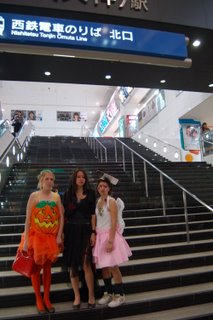
But this is by no means that strange an occurrence, even in a (relatively) cosmopolitan city like Fukuoka. A week ago, we were waiting at the same station, talking in a circle, and this time no fake blood, green fur, or foil carving knives were in sight. A short man, rotund in body and face, sidled up and joined the circle, not saying anything. He was probably pissed, or possibly a little unhinged. He peered at us with round, curious eyes, neither greeting us nor acknowledging his presence in our space. We were something to be looked at, a novelty. Then, after taking a good long look, off he shuffled.
He was in no way aggressive or unfriendly, but such an oblique gaze is very intrusive, and certainly the rudest I've experienced here. The people that I have met here have been almost uniformly polite, but such outstanding courtesy cannot hide Japanese society's colossal fascination with the west.
In Japan, a gaijin always wears fancy dress.
Pumping Iron
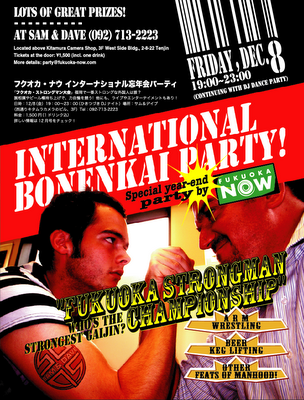 I've been doing some work at a magazine called Fukuoka Now, which seems to be something of a hub for the gaijin community here. A lot of random things seem to happen due to being associated with it. Like for example, last week, I was in their office doing some proof-reading for them, and they asked me to stand in for a model who had just cancelled on them. Of course, I obliged, and duly found myself face to face, arm-wrestling, with a huge, gurning, muscle-bound American called Tyler. I pointed out my relative lack of arm meat, but they were not bothered (the photo deadline being that afternoon). So I tensed for all I was worth, and stared into his eyes with all the hate I could muster, trying desperately not to laugh at his immense cocked eyebrow and rictus scowl.
I've been doing some work at a magazine called Fukuoka Now, which seems to be something of a hub for the gaijin community here. A lot of random things seem to happen due to being associated with it. Like for example, last week, I was in their office doing some proof-reading for them, and they asked me to stand in for a model who had just cancelled on them. Of course, I obliged, and duly found myself face to face, arm-wrestling, with a huge, gurning, muscle-bound American called Tyler. I pointed out my relative lack of arm meat, but they were not bothered (the photo deadline being that afternoon). So I tensed for all I was worth, and stared into his eyes with all the hate I could muster, trying desperately not to laugh at his immense cocked eyebrow and rictus scowl.The resulting ad can be seen here. They appear to have inflated my bicep to the size of my head. Yes, yours truly, advertising a competition to find the most masculine, muscular, manly of men.
Saturday, October 21, 2006
Life's a beach

Beach life, in late October. Life IS good.
We went up the coast to a tiny fishing village called Keya, and managed to find a beach that the civil authorities had managed NOT to ruin. The mile long concrete sea wall next to the beach was a tad excessive, but the beach itself was clean sand stretching into distance. A gorgeous sunny day, a slight chill in the wind, but the sea was easily warm enough to swim in. It seems local people rarely swim in the sea, especially at this time of year; any suggestion of the activity is met by shock and discouragement - "Too cold! Too dangerous!" Dangerous; surely not. But then, maybe so - there was rather more life in the sea than I am used to back home. First time we swam we were greeted by foot-long silver fish leaping a yard out of the water. At their closest, they were barely 5m away, throwing themselves into the air. They weren't actually Flying Fish, but 'fish that like to jump'. Anyone know why they do this? Answers on a postcard please...
They weren't the only sea inhabitants we found. After an impromptu skinny dip late at night, I had warmed up by the fire, and wandered down to see the stars and listen to the surf. At the foot of the beach, something bulked largely in the darkness. An absolute beast of a jellyfish...
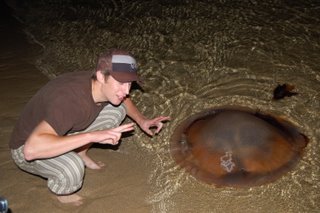 It was about 3ft in diameter, and half a foot high at the peak of its dome. I tried to lift it with a couple of sticks, but it was far to heavy. As can be seen from this photo, it was about the size of a Dave. I'm rather glad I didn't swim into it while naked. Really very glad indeed.
It was about 3ft in diameter, and half a foot high at the peak of its dome. I tried to lift it with a couple of sticks, but it was far to heavy. As can be seen from this photo, it was about the size of a Dave. I'm rather glad I didn't swim into it while naked. Really very glad indeed. Shudder.
There's a huge amount of light pollution in Japan, so I was relieved to find that the beach provided a rare chance to see the night sky. The Milky Way was out in force. The constellations are largely the same as in Britain, but as I'm a bit further south, Orion and co have all moved further up the sky than I'm used to.
 We drove back on the Urban Expressway, an incredible motorway that flies over the dense centre of Fukuoka. It must have taken real chutzpah to build such a big road so high up in the sky, especially in an earthquake zone. It is lit by a mesmerising cacophony of neon, with blinkng multi-coloured cat's eyes, arrows with running red lights, flashing signs and policemen waving crimson light sticks. Best of all was the section side lit with evenly spaced, piercingly yellow lamps, which a high speed created a strobe effect sufficient to induce epilepsy in just about anyone. You cannot see road, car, or sign; all you see is light. Absolute chaos.
We drove back on the Urban Expressway, an incredible motorway that flies over the dense centre of Fukuoka. It must have taken real chutzpah to build such a big road so high up in the sky, especially in an earthquake zone. It is lit by a mesmerising cacophony of neon, with blinkng multi-coloured cat's eyes, arrows with running red lights, flashing signs and policemen waving crimson light sticks. Best of all was the section side lit with evenly spaced, piercingly yellow lamps, which a high speed created a strobe effect sufficient to induce epilepsy in just about anyone. You cannot see road, car, or sign; all you see is light. Absolute chaos.
Monday, October 02, 2006
The Zutons
noun. 1. [ðɛ zʋːʈɒŋz]
Liverpudlian Indie band, commonly found in the U.K. characterised by feel-good rhythms, swinging sax, and long sweaty hair.
I went out with my friends last Friday night. Exhausted from a hard week, I caught the last train home, but a few people stayed out. Throughout the night, my friend Hazel had been watching an ungainly, overweight, middle-aged gaijin. Fukuoka seems to breed a particularly virulent strain of sleazy man, kept here by the unnatural fillip afforded to his sexual attractiveness by his western origin. As the club closed around half five, she saw with resigned dread that the man was approaching her. Small talk ensued at arm’s length. Then:
“Do you want to see The Zutons tomorrow? I’m their tour manager.”
“Er… Ok?”
He pulled out various sweaty pieces of paper, including a long, detailed tour schedule, and Hazel gave him all our names for the guest list.
The next evening we all trooped up at the venue, half expecting to be turned away. But no, all our names were on the guest list. In fact, we WERE the guest list. It seems The Zutons didn’t have many friends in Fukuoka, so we got in for free while everyone else had to pay a hefty 5600yen (nearly thirty quid).
The venue was small, and chock full of an incredibly polite Japanese audience. No anarchy, little dancing, polite silence during each song followed by rapturous applause. The crowd was great at clapping in time, but individual exuberance was rare. When the band cleared the stage to tempt calls for an encore, the crowd’s applause was a rhythmically consistent diminuendo. With the very real danger that they would fall silent, it was left to the westerners to make the noise.
“MMMMMOOOOOOORRRRRRREEEEEEE!!!!!!!!” I rasped, immediately followed by Japanese shouting, which just as swiftly died down again to a background hum.
“MO-ICHI-DO! MO-ICHI-DO! MO-ICHI-DO! [‘Once Again!’] ” chanted Hazel, alone.
The band seemed perplexed at the subdued crowd, but return they did, and rounded off the gig in anthemic style. As the final chords unfocussed into stock feedback, the band bowed and waved to the crowd. The bassist leant down to shake a few hands, and the crowd surged forwards. They became teenage pop fans, desperately struggling for memorabilia and the touch of their idol. It was a real shock after their previous behaviour. It’s as if they have had Indie Rock carefully explained to them, but haven’t quite understood it yet. Something of their original Japanese reserve remained. It definitely did not feel natural; more like an attempt to live up to an alien ideal.
Liverpudlian Indie band, commonly found in the U.K. characterised by feel-good rhythms, swinging sax, and long sweaty hair.
I went out with my friends last Friday night. Exhausted from a hard week, I caught the last train home, but a few people stayed out. Throughout the night, my friend Hazel had been watching an ungainly, overweight, middle-aged gaijin. Fukuoka seems to breed a particularly virulent strain of sleazy man, kept here by the unnatural fillip afforded to his sexual attractiveness by his western origin. As the club closed around half five, she saw with resigned dread that the man was approaching her. Small talk ensued at arm’s length. Then:
“Do you want to see The Zutons tomorrow? I’m their tour manager.”
“Er… Ok?”
He pulled out various sweaty pieces of paper, including a long, detailed tour schedule, and Hazel gave him all our names for the guest list.
The next evening we all trooped up at the venue, half expecting to be turned away. But no, all our names were on the guest list. In fact, we WERE the guest list. It seems The Zutons didn’t have many friends in Fukuoka, so we got in for free while everyone else had to pay a hefty 5600yen (nearly thirty quid).
The venue was small, and chock full of an incredibly polite Japanese audience. No anarchy, little dancing, polite silence during each song followed by rapturous applause. The crowd was great at clapping in time, but individual exuberance was rare. When the band cleared the stage to tempt calls for an encore, the crowd’s applause was a rhythmically consistent diminuendo. With the very real danger that they would fall silent, it was left to the westerners to make the noise.
“MMMMMOOOOOOORRRRRRREEEEEEE!!!!!!!!” I rasped, immediately followed by Japanese shouting, which just as swiftly died down again to a background hum.
“MO-ICHI-DO! MO-ICHI-DO! MO-ICHI-DO! [‘Once Again!’] ” chanted Hazel, alone.
The band seemed perplexed at the subdued crowd, but return they did, and rounded off the gig in anthemic style. As the final chords unfocussed into stock feedback, the band bowed and waved to the crowd. The bassist leant down to shake a few hands, and the crowd surged forwards. They became teenage pop fans, desperately struggling for memorabilia and the touch of their idol. It was a real shock after their previous behaviour. It’s as if they have had Indie Rock carefully explained to them, but haven’t quite understood it yet. Something of their original Japanese reserve remained. It definitely did not feel natural; more like an attempt to live up to an alien ideal.
Sunday, October 01, 2006
Spiders
I used to think I wasn't scared of spiders. Then I went for a walk in the woods.
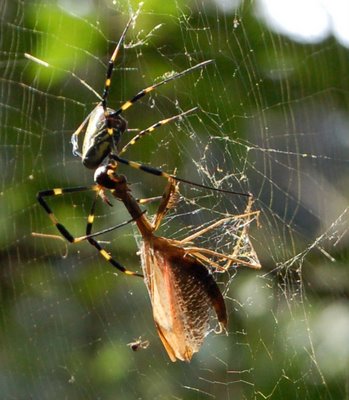
I've been in Japan for nearly a month, and I hadn't been for a proper hike yet. So I got suited and booted and cycled up through Dazaifu to a shrine at the base of the very-small-mountains (well, hills). It took about an hour to get up there from my house, and on my skoda of a bicycle it was exhausting. Had a pleasant lunch in the grounds of the shrine, next to a friendly little old lady nattering to her friend in speedy nihongo [Japanese]. I decided to only attempt the smaller hill by the shrine, and save the much larger and steeper Houmon-san for another day. (Japanese mountains are given the same honorifics as people, eg Mount Fuji is Fuji-san, just as my name is Ollie-san. Or rather Oh-rrie-san.) Once I got into the woods and started up the hill I found the path was repeatedly broken by fallen trees and bamboo; Typhoon Shan-Shan clearly did more damage than I'd thought. I was in a bit of dopey mood from lack of sleep, and when I found there were three paths up the hill rather than the expected one, I was a bit flummoxed. Similar confusion followed my discovery of a signpost at a fork in the path, pointing in two different directions, neither of which I could read. Check mate Nihongo.
After a bit of an explore, I deemed the whole path thing to be overrated, and decided to go off-piste. With a map and compass, clear skies and well-spaced trees, what could possibly go wrong?
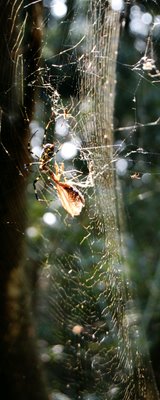 Suddenly I stopped. There was a cobweb inches from my chest, poised like a trip wire, ready to collapse onto me. My whole body flinched backwards, skin crawling. At the web's centre, an eight-legged, three-inch, black and yellow striped spider, balanced on its toe tips, curled like a claw. It was feeding on a large, tightly-bound moth. The web stretched between two trees about 2m apart, and the core of the web formed a disc 2ft in diameter. Baby spiders patrolled its edges, where the wind had scattered a few insects (now dessicated bundles).
Suddenly I stopped. There was a cobweb inches from my chest, poised like a trip wire, ready to collapse onto me. My whole body flinched backwards, skin crawling. At the web's centre, an eight-legged, three-inch, black and yellow striped spider, balanced on its toe tips, curled like a claw. It was feeding on a large, tightly-bound moth. The web stretched between two trees about 2m apart, and the core of the web formed a disc 2ft in diameter. Baby spiders patrolled its edges, where the wind had scattered a few insects (now dessicated bundles).
I used a stick to clear the way in front of me, snapping the silk joists at arm's reach. With the first jolt the spider shot upwards with graceless mechanical speed, before freezing at the highest point, well above my head. With its strength broken, the web wafted free, hanging on the breeze. The thought of walking into it made my skin shriek. The stroke of those fine strands on my face, the realisation and hurried flutter of hands brushing away the clinging silk, carefully exploring the backs of my arms and body, dreading that I'd find needle legs on soft skin, unnatural scuttling across my lumbering limbs, sharp black and yellow on pale pink. With those thoughts in my mind and my stick held firmly above my head, I cowered under the web. I may even have whimpered, which can only have lowered the spider's opinion of me yet further. Then, well past the web, I stepped forward with relief.

Only to find another web, expectant, in front of me. I stopped to look around me. Two in every five or so trees had just such a web stretched between them. Every web with its dominant spider, content to wait and watch. As far as I could see, sheets hung in the trees, a creeping jewel nestled in each. Blowing full in the breeze, but remaining tightly bound as they stretched. The sheer number of them turned my stomach.
It took me a few minutes to get back onto the path, walking slowly as I peered ahead of me; checking for webs and clutching my stick, ready to fence. I wanted to head straight back down to the shrine, but decided to try one last path. After clambering over yet another fallen tree, I found myself facing an extended troop of 10 or so japanese hikers, descending in the opposite direction. My 'konichiwa' was met with an amiable but curt 'ah, english teacher'. (I don't think I've tried my Japanese on anyone yet who has not immediately replied in English, whether stilted or fluent.) They had kindly cleared the path ahead for me, so the remainder of my ascent was spider-free.
That said, I walked into my room that night and felt those slender strands across my face. I could see neither web nor spider; perhaps it was just my over-active imagination. But I keep looking in corners, and flinch whenever I see a spider. I wonder how long this will last...
ADDENDUM: Am not actually mad. Just found the spider in my room. Very small. Definitely not scary. Phew.

I've been in Japan for nearly a month, and I hadn't been for a proper hike yet. So I got suited and booted and cycled up through Dazaifu to a shrine at the base of the very-small-mountains (well, hills). It took about an hour to get up there from my house, and on my skoda of a bicycle it was exhausting. Had a pleasant lunch in the grounds of the shrine, next to a friendly little old lady nattering to her friend in speedy nihongo [Japanese]. I decided to only attempt the smaller hill by the shrine, and save the much larger and steeper Houmon-san for another day. (Japanese mountains are given the same honorifics as people, eg Mount Fuji is Fuji-san, just as my name is Ollie-san. Or rather Oh-rrie-san.) Once I got into the woods and started up the hill I found the path was repeatedly broken by fallen trees and bamboo; Typhoon Shan-Shan clearly did more damage than I'd thought. I was in a bit of dopey mood from lack of sleep, and when I found there were three paths up the hill rather than the expected one, I was a bit flummoxed. Similar confusion followed my discovery of a signpost at a fork in the path, pointing in two different directions, neither of which I could read. Check mate Nihongo.
After a bit of an explore, I deemed the whole path thing to be overrated, and decided to go off-piste. With a map and compass, clear skies and well-spaced trees, what could possibly go wrong?
 Suddenly I stopped. There was a cobweb inches from my chest, poised like a trip wire, ready to collapse onto me. My whole body flinched backwards, skin crawling. At the web's centre, an eight-legged, three-inch, black and yellow striped spider, balanced on its toe tips, curled like a claw. It was feeding on a large, tightly-bound moth. The web stretched between two trees about 2m apart, and the core of the web formed a disc 2ft in diameter. Baby spiders patrolled its edges, where the wind had scattered a few insects (now dessicated bundles).
Suddenly I stopped. There was a cobweb inches from my chest, poised like a trip wire, ready to collapse onto me. My whole body flinched backwards, skin crawling. At the web's centre, an eight-legged, three-inch, black and yellow striped spider, balanced on its toe tips, curled like a claw. It was feeding on a large, tightly-bound moth. The web stretched between two trees about 2m apart, and the core of the web formed a disc 2ft in diameter. Baby spiders patrolled its edges, where the wind had scattered a few insects (now dessicated bundles).I used a stick to clear the way in front of me, snapping the silk joists at arm's reach. With the first jolt the spider shot upwards with graceless mechanical speed, before freezing at the highest point, well above my head. With its strength broken, the web wafted free, hanging on the breeze. The thought of walking into it made my skin shriek. The stroke of those fine strands on my face, the realisation and hurried flutter of hands brushing away the clinging silk, carefully exploring the backs of my arms and body, dreading that I'd find needle legs on soft skin, unnatural scuttling across my lumbering limbs, sharp black and yellow on pale pink. With those thoughts in my mind and my stick held firmly above my head, I cowered under the web. I may even have whimpered, which can only have lowered the spider's opinion of me yet further. Then, well past the web, I stepped forward with relief.

Only to find another web, expectant, in front of me. I stopped to look around me. Two in every five or so trees had just such a web stretched between them. Every web with its dominant spider, content to wait and watch. As far as I could see, sheets hung in the trees, a creeping jewel nestled in each. Blowing full in the breeze, but remaining tightly bound as they stretched. The sheer number of them turned my stomach.
It took me a few minutes to get back onto the path, walking slowly as I peered ahead of me; checking for webs and clutching my stick, ready to fence. I wanted to head straight back down to the shrine, but decided to try one last path. After clambering over yet another fallen tree, I found myself facing an extended troop of 10 or so japanese hikers, descending in the opposite direction. My 'konichiwa' was met with an amiable but curt 'ah, english teacher'. (I don't think I've tried my Japanese on anyone yet who has not immediately replied in English, whether stilted or fluent.) They had kindly cleared the path ahead for me, so the remainder of my ascent was spider-free.
That said, I walked into my room that night and felt those slender strands across my face. I could see neither web nor spider; perhaps it was just my over-active imagination. But I keep looking in corners, and flinch whenever I see a spider. I wonder how long this will last...
ADDENDUM: Am not actually mad. Just found the spider in my room. Very small. Definitely not scary. Phew.
Thursday, September 28, 2006
Novelty Japan Mark II
Don`t you just hate it when you get on a commuter train, and the only seats left are facing the wrong way. Nausea and lethargy inevitably ensue. Nightmare.
Or when you are with three or four friends, and the only seats left are sets of two, all facing in the same direction. Disconnected eye contact; irritatingly raised voices; broken conversations; awkard silences. Again: nightmare.
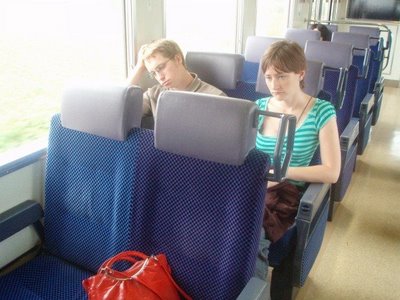
Well, the にしてつ train company has the answer. While the bottom of the seats remain solid, the seat backs can swing, yes SWING, back and forth. So the seats can be made to face either of the two potentially desired directions. So you can always face front. Or you can always find a block of four facing seats for you and your friends.

Now THAT is genius.
Or when you are with three or four friends, and the only seats left are sets of two, all facing in the same direction. Disconnected eye contact; irritatingly raised voices; broken conversations; awkard silences. Again: nightmare.

Well, the にしてつ train company has the answer. While the bottom of the seats remain solid, the seat backs can swing, yes SWING, back and forth. So the seats can be made to face either of the two potentially desired directions. So you can always face front. Or you can always find a block of four facing seats for you and your friends.

Now THAT is genius.
Monday, September 25, 2006
Typhoon Shan-Shan
Typhoon Shan-Shan had been approaching Japan for a few days, working its way northwards along the Asian mainland. By the time it passed over Fukuoka it was much weaker, but still considered the worst storm in many years.
I live on the 8th floor, which overlooks a set of paddy fields, and then a built-up town between there and the facing hills. I went out on our balcony to watch the storm draw in. The sky was full of bulky white clouds, but underneath them raced sharp black whisps. The wind had a warmth that I’ve never felt in England; like a hair dryer at arm’s length. Clouds could be seen flying in five different directions at once. Rain was only occasional, but when it came it was flung onto the balcony with such force that it stung my face. I had to prop the window open so I didn’t get locked out on the balcony, and hold it shut with an outstretched arm so it didn’t slam and shatter in the wind. As the wind got stronger it became more and more difficult to hold it shut, so I had to press the weight of my body against it. Given that I was on a circular wind trap on the 8th floor, it seemed time to go back inside.
Over the next couple of hours I could hear the storm worsening outside, and my ears popped from the pressure change. Cambridge House is a large modern building, and locked up safwe inside it would have been easy to forget about Shan-Shan but for the wind bashing against the windows. So I went for a walk with Dave and Graeme.
Once we got out the door it was clear that though strong, the wind had died down a bit, and was nowhere near full Typhoon speed. It was nighttime, but the distant glow of lightning and cold artificial light from the petrol station lit up the paddy fields. The rice was dark in silhouette, but when the wind turned it over it showed pale green. Plastic bags flew hundreds of metres in seconds. The cicadas strained to be heard above the shrieking and humming fence. The wind washed through swathes of rice, and scooped water from the pools and scattered it like seed. The neat lines of paddy field no longer spoke of rural peace and order; now their strict edges became token boundaries, desperately trying to contain a chaotic lake of billowing rice.
Between gusts it was calm, but when the wind blew it was strong enough to lean into, though never enough to blow me off my feet. It was beautiful and exhilarating; a tiny glimpse of power much greater than my own puny self, though it never fully exerted itself.
Honestly, I'm happy with a glimpse for now.
http://news.yahoo.com/s/afp/20060918/sc_afp/japanweathertyphoon
I live on the 8th floor, which overlooks a set of paddy fields, and then a built-up town between there and the facing hills. I went out on our balcony to watch the storm draw in. The sky was full of bulky white clouds, but underneath them raced sharp black whisps. The wind had a warmth that I’ve never felt in England; like a hair dryer at arm’s length. Clouds could be seen flying in five different directions at once. Rain was only occasional, but when it came it was flung onto the balcony with such force that it stung my face. I had to prop the window open so I didn’t get locked out on the balcony, and hold it shut with an outstretched arm so it didn’t slam and shatter in the wind. As the wind got stronger it became more and more difficult to hold it shut, so I had to press the weight of my body against it. Given that I was on a circular wind trap on the 8th floor, it seemed time to go back inside.
Over the next couple of hours I could hear the storm worsening outside, and my ears popped from the pressure change. Cambridge House is a large modern building, and locked up safwe inside it would have been easy to forget about Shan-Shan but for the wind bashing against the windows. So I went for a walk with Dave and Graeme.
Once we got out the door it was clear that though strong, the wind had died down a bit, and was nowhere near full Typhoon speed. It was nighttime, but the distant glow of lightning and cold artificial light from the petrol station lit up the paddy fields. The rice was dark in silhouette, but when the wind turned it over it showed pale green. Plastic bags flew hundreds of metres in seconds. The cicadas strained to be heard above the shrieking and humming fence. The wind washed through swathes of rice, and scooped water from the pools and scattered it like seed. The neat lines of paddy field no longer spoke of rural peace and order; now their strict edges became token boundaries, desperately trying to contain a chaotic lake of billowing rice.
Between gusts it was calm, but when the wind blew it was strong enough to lean into, though never enough to blow me off my feet. It was beautiful and exhilarating; a tiny glimpse of power much greater than my own puny self, though it never fully exerted itself.
Honestly, I'm happy with a glimpse for now.
http://news.yahoo.com/s/afp/20060918/sc_afp/japanweathertyphoon
Tuesday, September 19, 2006
Schizophrenic Japan
Komyozenji Shrine, about half an hour from my house, is one of the most peaceful places I have ever been to. The zen garden seems silent at first, until you begin to notice the grating cicadas, rustling leaves, and heavy wind. People just come to sit on the walkway, gaze, think, be.
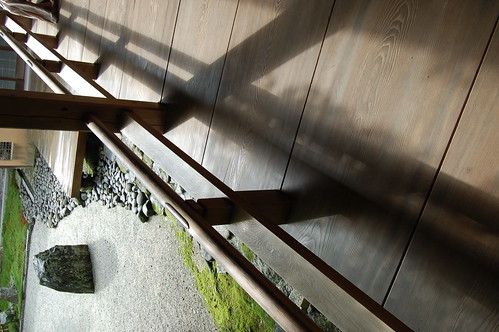
The raked pebbles surround various boulders, with deep hues of brown, red, and grey. In between are small oases of thick moss, with slender trees that bend and bow in the breeze.
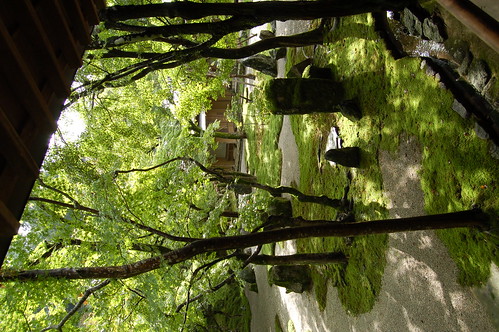
Then, two minutes walk away...


The raked pebbles surround various boulders, with deep hues of brown, red, and grey. In between are small oases of thick moss, with slender trees that bend and bow in the breeze.

Then, two minutes walk away...

Thursday, September 07, 2006
Subscribe to:
Comments (Atom)

